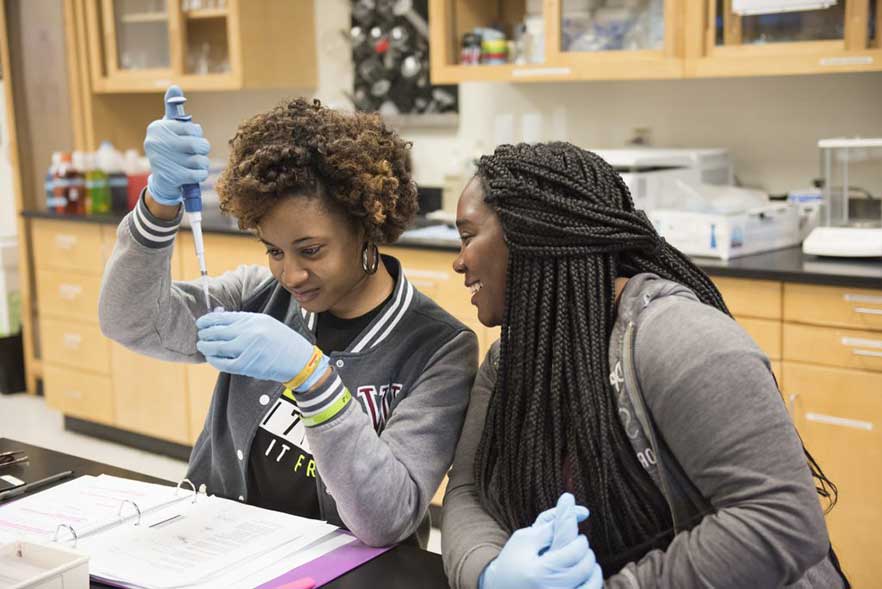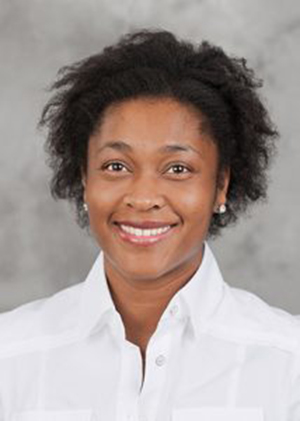From ‘cookbook’ to inquiry: WSSU reforms the biology lab

Dr. Stephanie Dance-Barnes knows that science starts in the lab.
“When students take the lead in developing the types of experiments that are conducted in the research-based laboratory, they gain a better understanding of scientific concepts,” says Dance-Barnes, an associate professor of biology and co-chair of the Department of Biological Sciences at Winston-Salem State University (WSSU).
A new WSSU Office of Science Initiatives’ teaching grant program has helped Dance-Barnes redesign the curriculum for General Biology Lab I, a first-year biology lab used during BIO 1113 General Biology, to support faculty-mentored research.
Instead of a “cookbook” lab where students follow directions in a manual, she says, students are responsible for creating their own manual, devising experiments and collecting data as they would in a true research lab.
“Fine-tuning the course involves structuring a more meaningful, research-based laboratory experience that gives students the capability to take the lead in developing the types of experiments that are conducted,” Dance-Barnes says.
The redesigned lab course, in its third semester, also helps faculty better identify when students are having difficulties with biological concepts and lab techniques, she adds.
Dance-Barnes says since the lab was redesigned, the survey responses from students have been tremendously positive.
“Students perceive themselves as more confident learners,” she says. “They also reported having a better understanding of biological and scientific concepts and were better skilled at the processes associated with carrying out experiments.”
Although the primary goal is to bring more students into the STEM pipeline, students also learn communications and critical thinking skills that are valuable to employers, Dance-Barnes says. Further, the redesign also saves students from buying pricy lab manuals.
Once the course is successfully restructured, its blueprint can be used to achieve the department’s goal of refreshing all freshman-level biology courses, she says. She also hopes to see the outcomes of the funded work published.
Supporting Faculty
Dr. Carthene Bazemore-Walker, director of science initiatives and chief research officer at WSSU, says the redesigned course is just one example of how WSSU’s Office of Science Initiatives is improving student learning in science, technology, engineering and mathematics (STEM).
“By supporting high-quality faculty research, we are igniting student success and helping our students learn in new ways,” Bazemore-Walker says. “Through undergraduate research, we have to opportunity to not only produce graduates with the critical thinking skills employers covet, but also to create more informed citizenry that will elevate our society as a whole.”
Science Initiatives launched three grant programs in 2016:
- Innovation: Grants of up to $5,000 for projects that improve teaching and learning in STEM courses.
- Catalyst: Grants up to $15,000 for projects that creatively integrate research and teaching.
- Frontier: Grants of up to $25,000 to support collaborative multi-disciplinary research projects in the natural and physical sciences.
In addition to Dance-Barnes, these faculty received inaugural grants from the Office of Science Initiatives:
- Debzani Deb (computer science): Innovation award for the project “Using Peer Instruction to Improve Student Engagement”;
- Xiuping Tao (physics): Innovation award for the project “Bridging Math and Physics: A Booklet on Calculus for Physics Topics and Problems.”
- David Kump (biology): Frontier award for the project “Characterization and Effects of Electrically Stimulated Myotubes on Proliferation and Differentiation of Muscle, Bone, Cartilage, and Fat.”
A bold past. A brilliant future.
For 125 years, Winston-Salem State University has fostered the creative thinking, analytical problem-solving, and depth of character needed to transform the world. Rooted in liberal education, WSSU’s curriculum prepares students to be thought leaders who have the skills and knowledge needed to develop innovative solutions to complex problems. WSSU is a historically Black constituent institution of the University of North Carolina with a rich tradition of contributing to the social, cultural, intellectual, and economic growth of North Carolina, the region and beyond. Guided by the motto, “Enter to Learn. Depart to Serve,” WSSU develops leaders who advance social justice by serving the world with compassion and commitment. Join us in celebrating our 125th anniversary with events throughout 2017. Learn more at the 125th Anniversary website.

